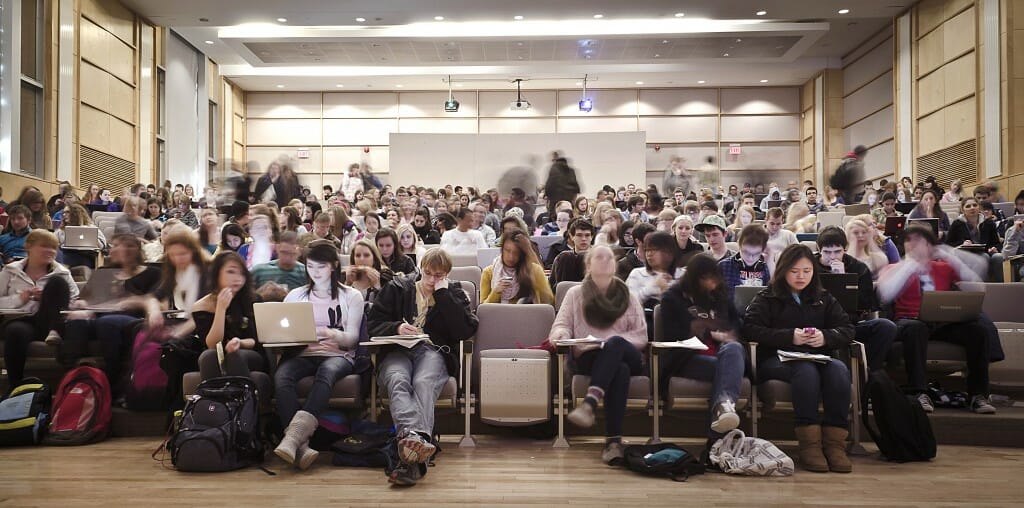
Nissim Mannathukkaren says he might support a faculty strike. Fellow professor Lorn Sheehan says he might not.
By the end of next month, both of them may have some tough decisions to make.
The Dalhousie Faculty Association (DFA) has been negotiating with Dal administration for eight months. If the next stage of negotiations doesn’t work out, the DFA will have to decide whether or not their problems are worth striking for.
Carrie Dawson, a former president of the DFA, is not part of the negotiating team but says the possibility that all faculty members could stop working sometime this term has not been ruled out.
“It’s entirely possible. We’re certainly hoping for a resolution. We’re working around the clock to try and get one, but it’s entirely possible,” she says.
The main issue is their pension, which is insolvent – meaning it doesn’t have enough money to work as it should – and issues of salaries and non-financial rights such as child care and maternity leave are also on the table.
Throughout February the DFA and the Dal administration will meet for three full days with a conciliator, a third party appointed by the province, to try to come up with a compromise.
The last of those meetings is Feb. 15. A media blackout will be in effect from Feb. 1-15. All interviews in this article took place in the weeks prior to the blackout.
The conciliator will prepare a report on a solution he thinks would work, and from that point the DFA and administration have two weeks to decide if the compromise is acceptable.
If it is, the story ends there. If not, a vote concerning a strike is next up.
As for whether or not it will come to that, it all depends on what happens during those three meetings. Mannathukkaren, the chair of the IDS department, is one faculty member who is on the fence.
“It depends on the final package, on what’s coming out of the negotiations,” he says. “If something is being taken away that I think is vital, then I will be willing to go to a strike for that and to pay the price. But if it is a minor, adjustable thing that can be sorted out, or which can be ceded, then that’s not a problem.”
For Mannathukkaren, it’s all about democracy.
“It’s a question of democratically coming to an agreement,” he says. “Obviously no one wants to support a strike if there’s a minor ceding of rights. But if it is a major one, many people – even I – would support a strike.”
Sheehan, associate director of Dal’s school of business, is less sure. His wife, Katherine Sheehan, is on the negotiating team for the Board of Governors.
“Us as faculty members do not want to be in a strike position,” he says. “We don’t receive pay during the strike time and it disrupts all the students who we are trying to teach; they do not complete their degrees on time.”
He also says the issue of salaries isn’t one that at this point can realistically be solved.
“That money has to come from somewhere, and the university doesn’t have a bottomless pool of money,” he says. “It only gets what the government gives them plus what tuition raises, so it really is a zero sum game.”
Sheehan says he knows the negotiations have been largely ineffective so far, but has hope for this next phase.
“This is the first attempt to try to essentially bring the two negotiating teams together in a serious and concentrated way,” he says. “Certainly what I’m looking for as a faculty member is to see more effort being made at the table to reach an agreement.”
A brief the DFA sent to the Ministry of Labour and Advanced Education on Jan. 19 emphasizes that faculty haven’t ruled out paying more toward their pension each month, and is also looking for a provincial exemption from a solvency test, which would give them more time before the millions of dollars needed to pay the pension is due.
Mannathukkaren says any agreement needs to be about more than just the faculty and their monetary issues.
“My interest is seeing that it is equitable, it is just, and it’s not just benefiting the faculty as a union,” he says. “It’s also about benefiting the students, the community as a whole, and the university as an employer.”
And he worries about the effect of a strike on the wider community.
“The students would face the brunt of it,” he says. “That’s why I’m saying that I sincerely hope it doesn’t come to that, and that no one is put through such difficulties.”
With files from Katrina Pyne.
CORRECTION: The original version of this article neglected to mention that Lorn Sheehan, associate director of the school of business, is the spouse of Katherine Sheehan, who is on the negotiating team of the Board of Governors. The Gazette regrets this error and has clarified this connection in the article.








